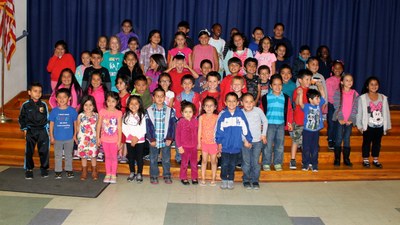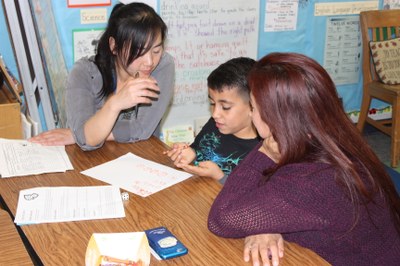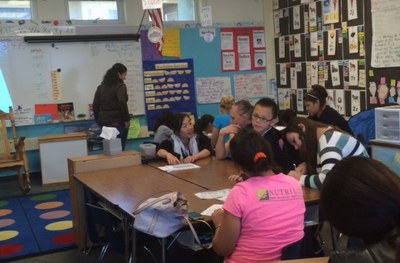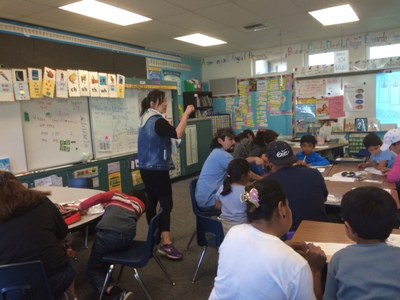Parent Engagement: Team Lead
Project Rationale
 The objective of this project was to increase involvement of the community, especially that of parent participation. The project aimed to provide opportunities to increase knowledge of parents and families regarding students’ academics, social and physical well-being, and empower parents/guardians to share information and become resources for one another. I hoped that with the initial involvement of parents, the team could build a team of parent liaisons to advocate for parent needs. The basic plan was to provide various events for parent involvement to build parent capacity as well as increase parents’ comfort attending school activities. We provided over five opportunities for parent engagement in the form of Family Fitness Night, Series of Literacy Nights and a district-wide Primary Math Night.
The objective of this project was to increase involvement of the community, especially that of parent participation. The project aimed to provide opportunities to increase knowledge of parents and families regarding students’ academics, social and physical well-being, and empower parents/guardians to share information and become resources for one another. I hoped that with the initial involvement of parents, the team could build a team of parent liaisons to advocate for parent needs. The basic plan was to provide various events for parent involvement to build parent capacity as well as increase parents’ comfort attending school activities. We provided over five opportunities for parent engagement in the form of Family Fitness Night, Series of Literacy Nights and a district-wide Primary Math Night.
Leadership Activities
My primary team members were the first grade teacher team. We planned out a series of three Literacy Sessions this year. There were other staff members in the larger team who participated in other non grade specific family events such as Family Glow-in-the-Dark Fitness Night and the Primary Math Night.
The Literacy sessions were held for all first grade parents by the first grade teachers. The team planned out the three areas of focus and set out the dates for them during the initial meeting. I also communicated with the principal and the office staff to place it on the school calendar. The first session was held in February and the focus was on decoding. The team felt that we needed students to master the decoding skills in order to advance in fluency and comprehension. The second session, held in March, focused on fluency and the last session, held in May, focused on comprehension. The team met a few weeks before each session to plan out invitations and specific activities for that session. The goal of each session was to give a simple definition of the skill, demonstrate a few activities or games, and finally have parents try them out with their children. For this reason, students were always asked to accompany parents. For the first two sessions, parents were given an exit survey. After the first survey, we learned that parents preferred to have sessions right after school instead of in the evening. So we reflected parents responses for future meetings. We also learned from the surveys that parents enjoyed learning about what students were learning and wanted to have more opportunities for this exchange.
“I really like the workshop because it [teaches us] a better way for them to learn and the same time have some fun playing some games.”
In October, a Family Fitness Night was scheduled for November. We sent out flyers and used automated telephone messaging to inform families to attend. With the assistance from a COPA (Creating Opportunities for Physical Activity) coach from Providence Little Company of Mary Hospital, the team planned out three rotation activities, including soccer, noodle tag, and basketball. After planning out activities, we worked on the logistics as it pertains to space within the school. With collaboration from office staff and principal, we purchased necessary equipment for the “Glow in the Dark” themed fitness activities from our family night funds.
 The district Primary Family Math Night was sponsored by the district. Two members of the family engagement team attended a district meeting for the math night in February and also planned for the activities a few weeks before the event. To make events go smoothly, the team was in charge of sending out invitations and automated messages, as well as preparing rooms and games. In addition, we had to find teacher volunteers to attend and help out during the evening event. In the course of planning out the Math Night, I had several opportunities to provide resources to teachers regarding math practices, such as Cognitively Guided Instruction practices as well as some math related trade books.
The district Primary Family Math Night was sponsored by the district. Two members of the family engagement team attended a district meeting for the math night in February and also planned for the activities a few weeks before the event. To make events go smoothly, the team was in charge of sending out invitations and automated messages, as well as preparing rooms and games. In addition, we had to find teacher volunteers to attend and help out during the evening event. In the course of planning out the Math Night, I had several opportunities to provide resources to teachers regarding math practices, such as Cognitively Guided Instruction practices as well as some math related trade books.
In the beginning of the project, I had planned on having the same members in the parent engagement team. However, as time went by, and also depending on the parent activity, I realized that the team would evolve. I had also planned to create a safe forum for parent communication and identify parent leaders and liaisons. Although conversations regarding liaison work occurred with some parents, I was not able to get this part of my leadership project started. I realized that I need to find resources and space within school to set this liaison work into action for next year. The most valuable lesson I gained in leading the parent engagement project was the importance of parent surveys. I realized in the course of this project that school leaders and teacher do not provide enough opportunities for parents to voice their thoughts and opinions. Often, the opportunities are not given priority. Although the paper surveys were highly effective this year, it would be beneficial for our school to invest in other methods (ipad, website, weblog) of sampling parent thoughts, feelings and ideas.
CAPEs Connection
My activities in implementing the family engagement project connects to the following CAPEs:
CAPE 1 (Developing and Articulating a Vision of Teaching and Learning Consistent with LEA’s Vision): One of our LEA goals are to increase parent participation and provide parent education to increase student success. Understanding the importance of parents and their engagement in student learning, I planned out literacy meetings and family nights with my team. In our work, my teammates and I had a shared vision about meeting the needs of families within the context of their family life, keeping our focus student/family-centered rather than teacher-centered.
CAPE 2 (Developing Shared Commitment to Vision): The vision to include parents in the academic work of our students as well as other community building activities was shared by all the teachers and staff who were involved in the team. Due to the fact that family engagement activities involved a variation of teams, I made sure to communicate effectively with the various audiences regarding the different goals of each of the engagement events.
CAPE 4 (Sharing Leadership with Others): Although I was a team lead, everyone in the team shared equal voice and vote in the way the family nights and parent literacy sessions were planned. For example, in the first grade level team, all four teachers contributed equally in planning and setting up for literacy sessions. In planning, I encouraged the inclusion and participation of non-traditional members such as the COPA coach to engage in decision making.
CAPE 5 (Promoting Implementation of K-12 Standards, Pedagogical Skills, Effective Instructional Practices and Student Assessments for Content Instruction): Understanding the demographics of our school community, I felt that it was important and necessary to inform parents of the academic skills students would need for literacy in the first grade. According to the surveys, the academic information and strategies provided at the Literacy sessions were new and helpful. By informing parents and building their strategies for working with their children, I hoped to break down barriers to student learning.
CAPE 7 (Understanding of the School and Community Context, Instructional Implications of Cultural/Linguistic, Socioeconomic, and Political Factors): Understanding the needs of the families and students, my team planned out the Literacy sessions for parents with a culturally relevant mindset. In the discussions prior to the sessions, we talked about the specific needs of second language learners as well as possible instructional strategies we could employ to help families specific to our community. For example, we provided the literacy games that students can work on at home, keeping in mind the economic factors that affect our community.
CAPE 9 (Working with Others to Identify Student and School Needs and Development of Growth Plan): I began the Literacy sessions with the framework of a Plan-Do-Study-Act (PDSA) cycle. The team planned the first session, provided and practiced the strategies with families, and then we studied the effectiveness of our sessions by reading parent surveys. We performed the PDSA cycles for the two following Literacy sessions, evaluating our process each time. Through this cycle process, I was able to institute, manage and evaluate a school change process in actively engaging parents in the learning process for their students.
CAPE 11 (Identifying and Using Resources): For all of the parent engagement activities, the team met to plan out needed resources for promoting our growth plan. For example, for the Family Fitness Night, I identified that Mr. Sheppard, the COPA coach from Providence Little Company of Mary Hospital would be an invaluable resource. He coaches teachers on campus in teaching physical education and provided excellent ideas and resources for the logistics of our family night. In addition, in cooperation with the administrator, office staff, and the district office, I was able to locate funds necessary to purchase equipment for the parent engagement activities.
CAPE 15 (Identifying and Facilitating a Variety of Professional and Personal Growth Opportunities for Faculty, Staff, Parents, and Other Members of the School Community in Support of the Educational Program): By including parents in the Literacy sessions, I was able to involve and provide growth activities that helped promote their children’s academic growth. Furthermore, through the Primary Math Family Night, I was able to share with parents and also team members about Cognitively Guided Instruction (CGI) in math. I also provided information to teachers about a conference opportunity for CGI practices this summer.
CAPE 17 (Developing, Implementing, and Monitoring the School’s Budget): Through School Site Council (SSC) meeting, I was able to participate in conversation regarding our 2014-15 LCAP (Local Control and Accountability Plan) as well as developing revisions for the 2015-2016 LCAP funding. In working with the parent engagement project I became convinced of the need for 21st century technology in providing parent workshops and sampling parent thoughts, ideas and concerns. In understanding the budgeting change under the LCAP, I explained the need for parents and school community to access computers and/or tablets and helped develop priorities for spending for the next school year.
CAPE 19 (Representing School’s Accomplishments and Needs to LEA and Community): In coordinating the Math Family Night, I served as a spokesperson for the school to the district. After attending the math night facilitator meeting and after a successful Primary Family Math Night on site, I communicated with the district Math Teacher on Special Assignment about the successes we experience during the event.
CAPE 20 (Involving the Community in Helping Achieve Vision and Goals): All of the parent engagement activities helped me practice community building through collaborative planning with teachers, working with office staff and outside resources such as the COPA coach, Mr. Sheppard. In addition, the survey results from the Literacy sessions helped me understand the diverse needs and expectations of the families and I used this knowledge to modify the content and logistics of the Literacy sessions.
Reflection

I began the year as a team lead for parent engagement for the first grade teacher team. However, as the year progressed, I soon took on roles for other parent engagement activities at school. I envisioned that it would be easier to suggest family engagement activities on a smaller scale. This way, I would be able to put our plans into action more quickly. However, because of such high interest of some teachers, the larger parent engagement events were actualized with ease as well. It was encouraging and invigorating to work with highly motivated staff and family members. In addition, the district support for our Family Math Night was also extremely encouraging. I believe that any activity involving families and community is always exciting and rewarding. One of the personal challenges that I would like to improve next year is to make sure that the activities and events do not stop at merely involving parents in the business of school. I would like to reevaluate parent engagement with a leadership team and think of ways to make the engagement even more authentic, where parents feel that they have ownership of the school.
Supporting Documents
Correspondence with team/Literacy Session


